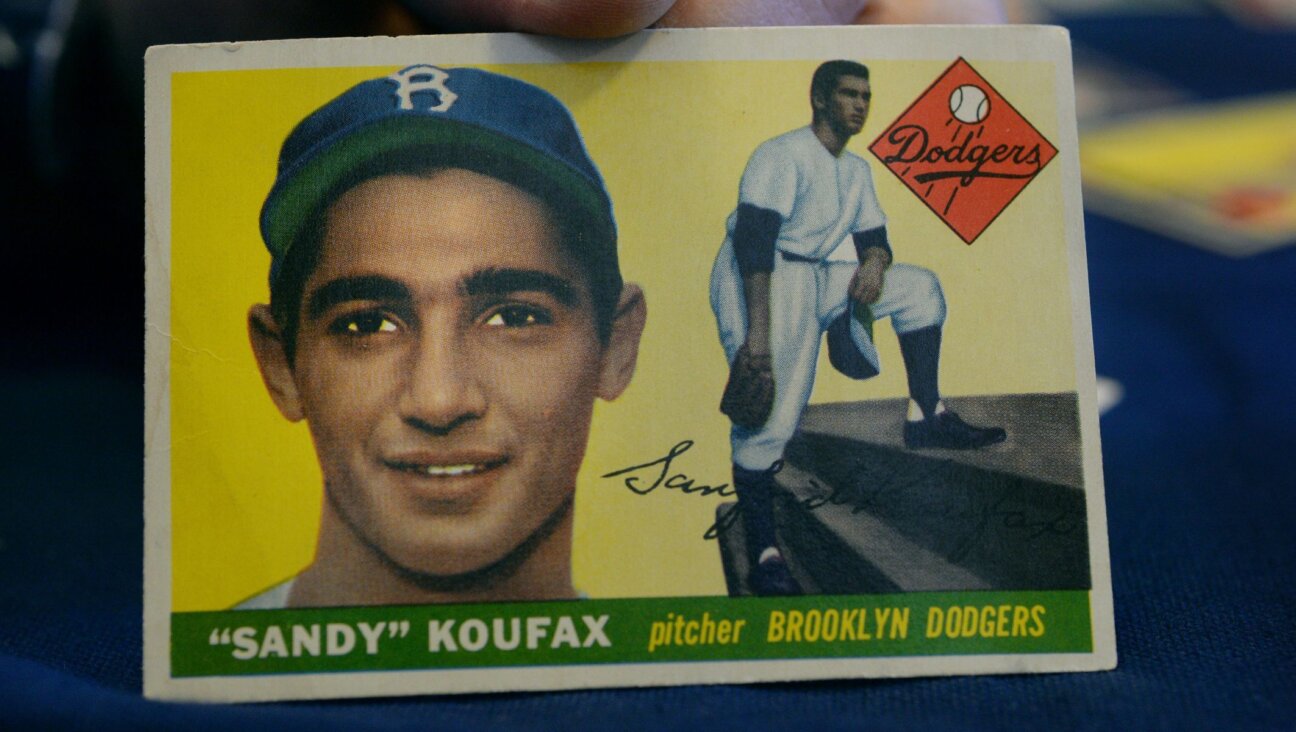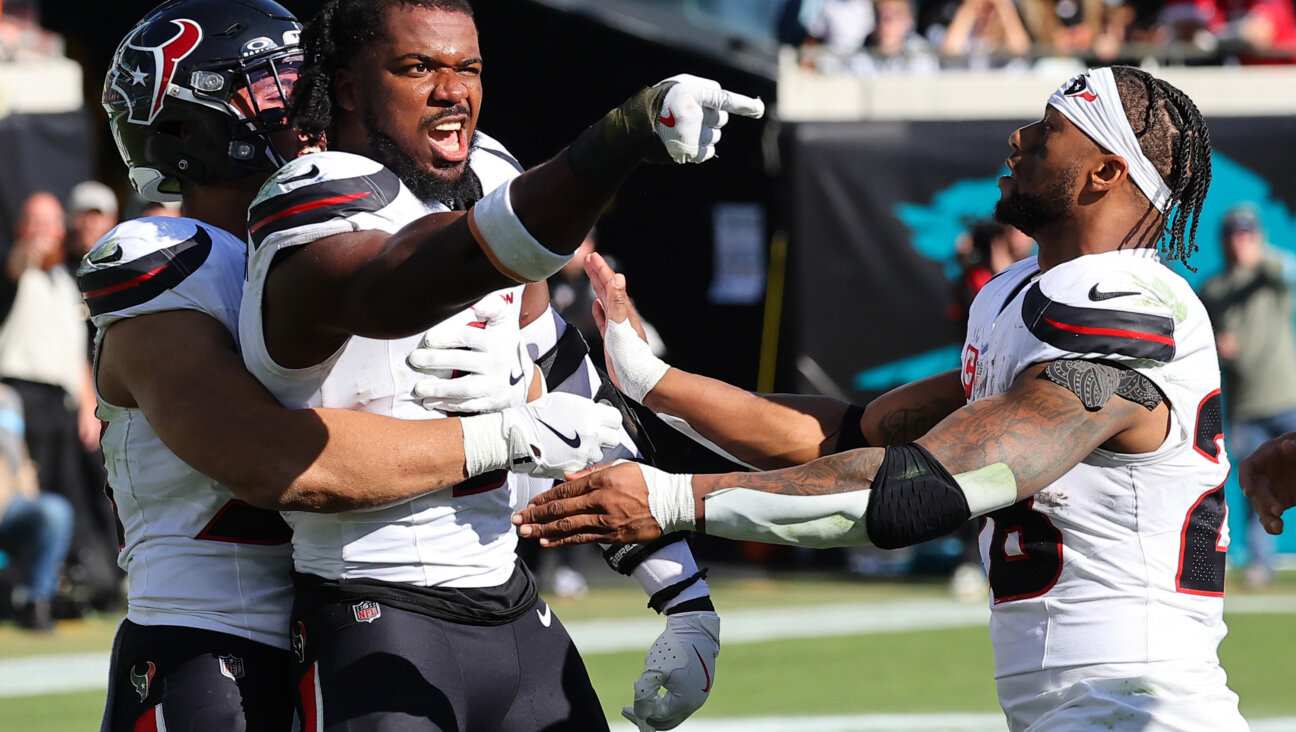Israel’s Manor Solomon is going to play for England’s most Jewish soccer club
Manor Solomon is expected to join Tottenham Hotspur — a club controversially nicknamed the ‘Yids’

Manor Solomon (left) s challenged by Kyle Walker during an April Premier League match. Photo by Gaspafotos/MB Media/Getty Images
Israel’s biggest soccer star, Manor Solomon, is set to join England’s most Jewish team, fulfilling a lifelong dream.
Solomon, a 23-year-old winger from Kfar Saba, Israel, who debuted in England’s Barclays Premier League last season, is expected to sign a five-year contract with North London side Tottenham Hotspur this week, according to recent reports. The club has been nicknamed the “Yids” and their fans the “Yid Army” for the connection, although use of the term — which originated as a pejorative — has proved somewhat controversial.
According to The Athletic, Solomon, a Sephardi Jew, grew up “with a soft spot” for the club, which has a fan base in Israel.
Spurs fans hailed the signing of Israel’s most accomplished soccer player since Liverpool midfielder Yossi Benayoun — as did Jewish soccer fans who followed Solomon’s five-goal spree in the 2022-23 campaign with West London side Fulham F.C.
“Delighted with this,” wrote former Spurs player Graham Roberts on Twitter. “An excellent young player who knows exactly where the goal is!”
Solomon’s path to Tottenham
Solomon is the only active Israeli player in England’s Premier League, composed of the country’s top 20 teams. (There are almost 100 professional soccer teams in the English soccer tier system.)
But his path to what many consider to be the world’s leading soccer league has been far from a smooth ride.
In 2019, Solomon — then 20 — signed with Shakhtar Donetsk, a Ukrainian soccer team known for developing young talent. Through his first three seasons with the club, he scored over a dozen goals, including with jaw dropping shots like a last-minute winning goal against the Italian club Atalanta BC in 2019.
But just as Solomon’s career was taking off, the 2022 Russian invasion of Ukraine threatened to derail it.
“I woke up to the sound of explosions and sirens,” Solomon said in an interview with BBC Sport last year. “It was like being in the middle of a movie.”
He packed as many of his belongings as he could, and drove 17 hours to the Ukrainian border, where he crossed into Poland with the help of Israeli diplomats.
Thanks to special FIFA rules, which ordinarily prohibit players from unilaterally suspending their contracts, Solomon was able to return to the soccer pitch after a hiatus of a few months — this time wearing a Fulham uniform.
Though initially set back by a knee injury, Solomon made a major impression on his return, scoring in five straight games and earning a nomination for the league’s Player of the Month award in March.
That remarkable run got the attention of numerous Premier League clubs — with Tottenham Hotspur and its North London rival Arsenal chief among them.
‘Completely won me back’
Tottenham’s Jewish reputation dates to the late 19th century, when many Eastern European Jews began settling in Tottenham Hale, an industrial area in North London.
The club, which existed before the era of Jewish migration to the area, quickly became central to the identity of many Jewish working-class soccer fans. By the 1930s, reports suggested that Jews made up a third of the crowd at the club’s games.
The club’s fanbase has since evolved; The Jewish Chronicle estimates that only 5% of its current supporters are Jewish. But the Spurs are still widely associated with the Jewish community, a connection that has often made the club a target of antisemitism.
As early as the 1960s, opposing fans began using the Y-word as a slur against Tottenham fans. Infamously, some have even hissed at the Tottenham stands to symbolize the gas chambers used in concentration camps during the Holocaust.
In response, the Spurs’ fan base leaned into their Jewish identity, with many adopting the team’s historical Jewish affiliation as a badge of honor. Fans began calling themselves the Y-word, and often brandished Israeli flags and Stars of David at games, according to The Jewish Chronicle.
But last year, the club called on fans to retire the term. “Now more than ever is the time to reassess and reconsider its ongoing use,” the club said in a statement. “We recognise how these members of our fanbase feel and we also believe it is time to move on from associating this term with our club.”
Fans appeared not to heed the call, however, and many continue to chant the Y-word in the Tottenham stands today.
Antisemitic taunts from opponent clubs have continued, as well. In 2019, for instance, West Ham United Football Club apologized after a video surfaced of fans shouting “f****** Jews” at the Spurs during a game against Manchester United.
Solomon will only be the second Israeli soccer player to don a Tottenham uniform — almost three decades after Israeli star Ronny Rosenthal, nicknamed “Rocket Ronny,” completed his three-year tenure with the club.
Team fans hope Solomon will help provide some of the depth Tottenham sorely needs, as the club limped to an eighth-place finish in the Premier League last season. He’ll expect to start the season as a reserve left winger.
“Daniel Levy has completely won me back,” one Tottenham fan wrote on Twitter, referring to Tottenham’s chairman, who is Jewish. “Manor Solomon is a Spur.”
A message from our Publisher & CEO Rachel Fishman Feddersen

I hope you appreciated this article. Before you go, I’d like to ask you to please support the Forward’s award-winning, nonprofit journalism so that we can be prepared for whatever news 2025 brings.
At a time when other newsrooms are closing or cutting back, the Forward has removed its paywall and invested additional resources to report on the ground from Israel and around the U.S. on the impact of the war, rising antisemitism and polarized discourse.
Readers like you make it all possible. Support our work by becoming a Forward Member and connect with our journalism and your community.
— Rachel Fishman Feddersen, Publisher and CEO























